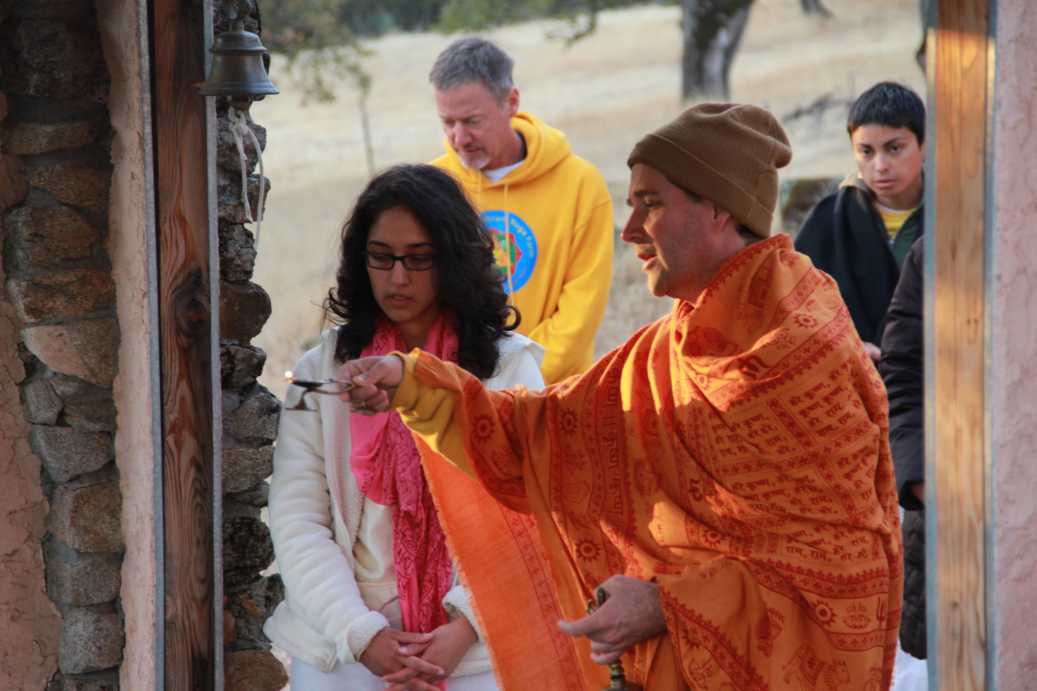KARMA YOGA
What is Karma? | What is Karma Yoga? | How to practice karma yoga?
Below is a testimonial for this book.
Karma Yoga
Quote: “The first step in the spiritual path is the selfless service to Humanity”
– Swami Sivananda in “Sivananda Upanishad”
Blog Article on Karma to Dharma: yogafarm.org/karma-to-dharma/
What is Karma?
Karma literally means “action”. Action always comes with the consequence of the action.
The law of karma is the law of action and reaction, illustrated by the well known saying “what we reap is what we sow”, and also the law of retribution, which explains that “what we receive is the result of what we did in the past”.
Nothing is by accident, merit, demerit, honor, or dishonor; any happening in our lives is the result of karma.
The philosophy of karma is at the foundation of all oriental philosophical thought, Hindu and Buddhist. Understand how this law applies in life, helps us to spiritualize our life and progress.
3 kinds of Karma
It is said that there are three kinds of karma: past karma, present karma and future karma.
The three are inter-related and can be summed up thus:
The present karma is the result of the past karmas, and is our reaction to the past, and will determine our future karmas.
This body and mind are nothing but the result of past karma. These past karmic impressions have tendencies to reproduce themselves and determine the individual’s circumstances and choices.
These reactions to what has happened determine if they will learn the spiritual lesson or not. The residue of what needs to be learned will unfold in another context later on.

Karma is neither good nor bad
From the point of view of the Atman or soul, karma is that which binds us to the wheel of birth and death; the goal of the Yogi is to break through the chain of karma and release himself from all bondage caused by spiritual ignorance.
This release from karma is gradual, as many lessons need to be learned and many experiences gathered for the individual to truly understand the Truth, which is the only thing that can set him free.
What is Karma Yoga?
“Karma Yoga is the Selfless Devotion of all the inner and outer activities as a sacrifice to the Lord of All Works, offered to the Eternal as Master of all the Soul’s energies and austerities.” – Bhagavad Gita.
“Work done in the right attitude becomes consecrated; becomes a sacred act. A life consecrated in doing selfless acts will become a divine life.” – Swami Sivananda.
As our life is the result of karma, our life itself holds the key to our liberation. The idea is to spiritualize our life and our actions in order to be free.
The problem is that we are very attached to our actions and our works; we constantly identify with our actions and take pride in what we are doing.
Our ego is very much invested in our talents, skills, knowledge and activities. It takes detachment towards our actions in order to see ourselves and our actions in a different light.
In the cultivation of the spirit of Karma Yoga lies our freedom and spiritual release.
How to practice Karma Yoga?
#1 Right Attitude
It is not what you do that counts, it is the attitude while doing it that determines whether it is a job or Karma Yoga (i.e., a binding or a liberating job).
Work is worship.
Swami Sivananda advised that you should, “Give your hands to work and keep your mind fixed at the Lotus Feet of the Lord.”
#2 Right Motive
This is similar to right attitude; it is not what you do that counts but your real motive behind it. Your motive must be pure.
Swami Sivananda says, “Man generally plans to get the fruits of his work before he starts any kind of work. The mind is so framed that it cannot think of any kind of work without remuneration or reward. A selfish man cannot do any service. He will weigh the work and the money in a balance. Selfless service is unknown to him.”
Consider the example of two girls who were drowning.
Two young men immediately jumped in to help them. One man jumped in so he could ask the girl to marry him. The other said only, “I have done my duty. God gave me an opportunity to serve and improve myself.”
The external action was the same, but the inner motive was different.

#3 Do Your Duty (Swadharma)
Often our specific duty in life is referred to as “Dharma”, which means righteousness.
Performance of duty frees the soul, and non performance of duty keeps the soul in bondage.
Perform your duty according to your caste and your stage in life, which are created by the Gunas or qualities born from a person’s nature.
The highest duty is to God, the In-dweller, to learn and to progress.
#4 Do your best
Whatever you do, do your best. You will incur demerit if you do not give your best.
If you know of a better way to serve then you must make use of it. You cannot hold back from fear of the effort required or from fear of criticism.
Do not do work in a sloppy manner because no one is watching or because the work is not for you. Give your best effort.
Try to do actions that can bring maximum good and minimum evil. Try at all times to accumulate merits.
Do Karma Yoga increasingly often as this will accelerate your paying off of karmic debts. There is no time to lose.
Swami Sivananda has said, “You can elevate others only if you have elevated yourself. A prisoner cannot liberate other prisoners.”
#5 Give up results
God is the Doer. You are not the Doer; you are only the Instrument.
You do not know God’s intentions or God’s plans. God is the actor (i.e. the Self never acts).
It is only the Gunas that are playing. The way to realize this Truth is to constantly work for work’s sake and to let go of the outcome, good or bad.
It is the desire for action that binds the individual. (I am the doer is wrong knowledge.)
It is detachment from action (I am only the instrument is right knowledge) that will dissolve the Karmic seeds.
Detachment from results also means detachment from the type of job itself. There are neither inferior nor superior jobs.
Don’t be attached to your job and be ready to give up your job when necessary.
Note that Karma is always working. You will always be drawn to things that you need to learn.


#6 Serving God or the Self in All
Do unto others what you would like to have done to yourself.
Love thy neighbor as thyself. Adapt, adjust, accommodate. Bear insult, bear injury. Unity in diversity.
We are all parts of the same body. Practice humility in action. Beware of power, fame, name, praise, and censure.
#7 Follow the Discipline of the Job
Every work experience has something to teach you. Try to do your best and the lessons of your work will be rich.
Each job involves different requirements in terms of time, degree of concentration, skills or experience, emotional input, physical energy, and will.
#8 Qualifications of a Karma Yogi
“A Karma Yogi should be free from lust, greed, anger, and egoism. He should try to remove these. He should be humble and free from hatred, jealousy, harshness, etc.
A Karma Yogi should have an amiable, loving, and sociable nature. He should be able to move and mix with everybody without distinction of caste, creed, or color. He should have perfect adaptability, mercy, and cosmic love.
He should be sympathetic and tolerant. He should be able to adjust himself to the habits and ways of others. He should always have a cool and balanced mind.
He should have equal vision. He should rejoice in the welfare of others. He should lead a very simple life.
A Karma Yogi should have a sound, healthy, and strong physical body. He should do regular Pranayama, physical exercises, and Asanas in order to keep up a high standard of health. He should have the power of endurance.”
-Swami Sivananda.

What will the practice of Karma Yoga bring?
– You will develop and learn new skills.
– It will help personality growth, health, and fulfillment.
– It will thin out the ego and remove selfishness.
– You will achieve Purification of the heart.
– You will overcome the “likes and dislikes” of your mind.
– You will eliminate prejudices.
– You will feel oneness, unity and unbounded joy.
– You will become more loving, balanced, and sattvic.
– You will have a more flexible mind and a more tolerant attitude (less rigid).
– You will broaden your outlook on life.
– It allows you to spiritualize your activities.
– It will keep you focused on God throughout the day.
Yoga Teacher Training Course
Check out our 200-hour Yoga Alliance certified Yoga Teacher Training Courses offered twice a year in California, 3x in Vietnam, once in China and once in Japan.
Foundational Courses
Choose from upcoming courses for beginners and intermediate level students.
Yoga Vacation
Rejuvinate your body and mind. Experience and progress with daily Yoga classes. Learn the 12 basic asanas and pranayama. Enjoy daily meditation, chanting, and organic vegetarian meals.
Check out our Blog
OUR TEACHINGS
The contents you will find here are reproduced from the book “Essentials of Yoga Practice and Philosophy” compiled by Swami Sitaramananda.
Satsang
What is Satsang? What is Meditation? What is Kirtan Chanting?
5 Points of Yoga
Exercise, Breathing, Relaxation, Diet, Positive thinking and Meditation
Health
What is True Health? What is health of body, mind, and spirit?
Prana
What is Prana? How can I access prana? What is kundalini energy?
Raja Yoga
What is Raja Yoga? What are the eight limbs? What is ashtanga yoga?
Jnana Yoga
Who am I? What is Vedanta Philosophy? What is Sat-Chit-Ananda?
Mantras
What is a mantra? What is sanskrit? How do I get a mantra?
Yoga Poses
What is in a basic Sivananda class? What are the benefits? What are some guidelines?
Yoga
What is Yoga? Where did Yoga come from? What is Classical Yoga?
Life
What is the meaning of Life? What is Freedom? What is Happiness?
Mind
What is the mind? How does the mind work? Am I my mind?
Positive Thinking
What is thought? What are techniques to practice positive thinking?
Karma Yoga
What is Karma? What is Karma Yoga? How to practice karma yoga?
Bhakti Yoga
What is True Love? Who is God? What is an inner Bhava?
Kirtan Chanting
What is Kirtan Chanting? How does it work? What do the chants mean?
Ayurveda
What is ayurveda? What are the 3 doshas? What is disease according to ayurveda?